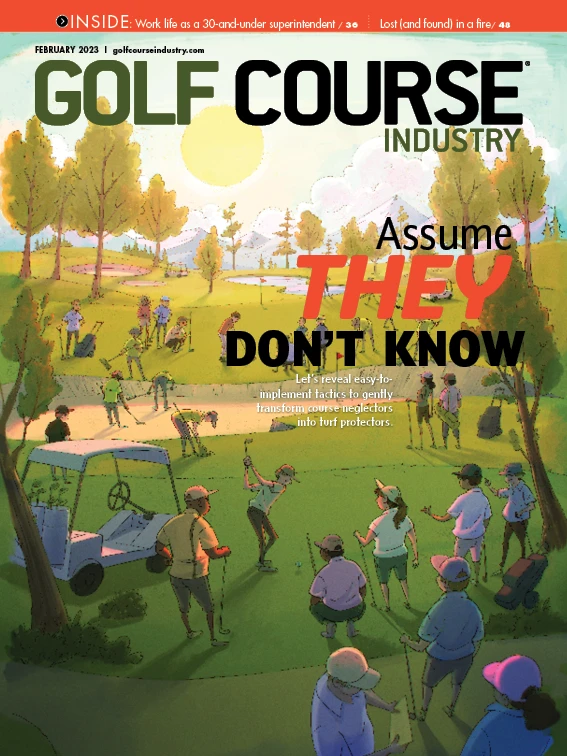

As a good number of my peers traveled to Orlando earlier this month for the GCSAA Conference and Trade Show, investing time and money in their continuing education, I’m pondering the validity of a thought permeating through the superintendent community.
It seems there are some among us who feel strongly that today’s professional turfgrass manager no longer needs higher education to succeed. In other words, that young person on your team displaying the passion that drives us could be nurtured and learn his or her way to the top from the ground up.
Granted, not everyone needs a four-year bachelor’s degree to succeed in life, let alone in our profession. But I don’t understand how we can expect future superintendents to be successful without possessing a sound agronomic base and business acumen. Organizations like the GCSAA, BIGGA and FEGGA work on behalf of their members to elevate the profession and educate business stakeholders that we are more than just someone who “mows the grass.”
We have seen countless technological advancements enter our realm during the last 20 years, including computerized irrigation systems, soil moisture meters and onsite weather stations, to more advanced technology like GPS sprayers and drones. You could say we have come a long way from the days of Old Tom Morris and his wheelbarrow and spade. I find it interesting that some folks are taking to social media and proposing advanced education is no longer necessary to succeed in the workplace.
My grandfather once told me, “Matt, there is no such thing as too much education.” And I have lived by those words and even quoted them when making the case for continuing education and professional development.
We work in a unique environment. We are mostly motivated by a common love for the outdoors, schooled in agricultural sciences, and forced to learn on-the-job managerial skills, human resources and business administration.
I will admit the American model is not the only way. The United Kingdom for decades has managed an apprentice program where young greenkeepers who quickly take to the work and show an interest in progressing are trained on the job before enrolling in institutions of higher learning and pursuing advanced diplomas and qualifications.
In January 2020, I sat in a room of assistants and superintendents when Armen Suny of Kopplin Kuebler & Wallace told everyone that, when he assists clubs in their search for a new superintendent, the letters MBA garner more attention than any other degree or professional designation. If superintendents need advanced degrees in business administration to stand out from their peers when competing for top-paying jobs, I’m not certain how we can expect to achieve such with this mindset that college degrees are no longer necessary.
Is a four-year college degree in crop sciences absolutely necessary to becoming a successful golf course superintendent? No, otherwise associate and certificate programs specializing in turfgrass science and/or golf course management would never have come into existence.
But the folks with those bachelor’s degrees have a broader knowledge base and could shift into other sectors of agriculture if they so desire. They are true agronomists, standing out among this growing trend to call every golf course superintendent an agronomist or a director of agronomy when they might not possess those credentials.
You mean to tell me we have spent the past 30 years banging the drum to get folks to understand that this job is more than just cutting grass and involves complex science and technology, and just when the science and technology has become the most advanced any of us has ever witnessed, we are going to say, ‘Nah, turns out you don’t really need a degree?’ What the hell kind of logic is that?!
I’m supportive of folks getting started in the business before they begin studies related to the business. Heck, that was me. I was working at Lake Bonaventure Country Club and attending Southwest Virginia Community College long before I discovered I wanted to pursue an education tailored for a career as a golf course superintendent. Helping those team members of ours discover a passion and nurturing it along is the best way to build the future of our industry.
But to tell someone college isn’t necessary is irresponsible. As technology continues to advance toward something none of us has even dreamed yet, I don’t think clubs will trust the guy or gal who just cuts grass. You’re going to need a piece of paper on your office wall that gives you credibility and earns respect.

Explore the February 2023 Issue
Check out more from this issue and find your next story to read.
Latest from Golf Course Industry
- From the publisher’s pen: Conscientious of a bigger role
- Bernhard and Company partners with Laguna Golf Phuket
- Terre Blanche showcases environmental stewardship
- VIDEO: Introducing our December issue
- Bernhard and Company introduces Soil Scout
- Nu-Pipe donates to GCSAA Foundation’s Centennial Campaign
- GCSAA enhances golf course BMP tool
- Melrose leadership programs sending 18 to 2026 GCSAA Conference and Trade Show





